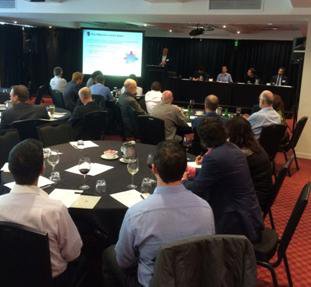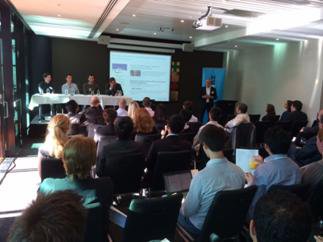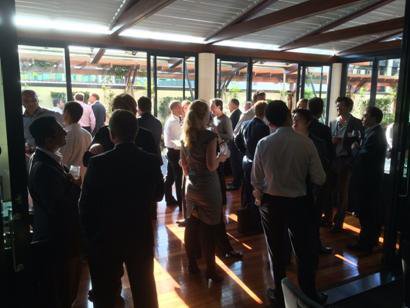Exploring Cryptocurrency
1 Apr 2014
Exploring Cryptocurrency – what’s the real deal?
Using money that doesn’t actually exist is a relatively big concept to get your head around, but it’s making a lot more sense now to those who attended the latest Payments Hub event held by Payments NZ.
The March meeting tackled the hot topic of cryptocurrency, with a focus on one of the biggest players in the field, Bitcoin.
After a quick update on the new Mobile Device Rules & Standards, Payments NZ Chief Executive Steve Wiggins handed the floor over to the guest panellists and, most importantly, the audience.
As Wiggins said in his welcome, the event was a chance for attendees to “be interactive, to participate, and to learn more than they did when they walked in the door” on a subject that is most definitely on the radar for those in the payments industry.
As always, the four guest speakers had been chosen for their thought leadership, diverse opinions, and willingness to engage in some healthy debate on the subject.
Samuel Lay, a software trainer who half-jokingly described himself as a “bitcoin evangelist” injected some infectious enthusiasm into the evening, and was able to share some strong reasons as to why we should all get excited about cryptocurrency.
Paul Salisbury, who is already working full-time to help companies adopt and integrate

the technology and develop new services around it, shared the excitement and gave the group a glimpse of what’s possible.
There to share a more technical perspective was Gerard Creamer, owner and Managing Director for PayStation, who observed that the system was made to “fill a gap” and is still very much in its infancy, with much more to come in the near future.
It was no surprise to hear that the NZ Bankers Association has been watching the topic of digital money very closely, and so Chief Executive Kirk Hope completed the panel to “point out the inadequacies” and share his perspective on the invariable challenges that lay ahead.
Stephanie Chapman, from FSCL, was a first-time attendee at the Hub, and appreciated that both sides were strongly represented.
It was also great that it was question based, from the floor, rather than a lecture,” she said.
Running the event this way allowed for plenty of discussion, along with some unexpected insights. At one point, a curious question and a quick show of hands revealed that two attendees already owned Bitcoins, but it seemed many had no experience or understanding beyond what they’d read before coming to the event.
Lay jumped in to explain the system, likening it to the Internet 20 years ago. He made the point that nobody saw a need to use the Internet then and suggested “Bitcoin is to money what email has been to letters.”
Familiarity with the technology aside, there were some very clear concerns presented about the safety of using an intangible and unregulated system. Volatility formed a large part of the discussion, and security, with reference to the recently compromised and now bankrupted cryptocurrency exchange, Mt Gox.
The most recurring concerns appeared to be around the need for regulation, transparency and scarcity, and the assertion that cryptocurrencies are the domain of black market organisations. But even that was handled with openness and an air of light-heartedness, with Hope jokingly asking Lay whether he was willing to talk about any of the many transactions he’d made using the technology.
Humour aside, the event provided a valuable opportunity for panellists and audience to learn from each other, and challenge both each other’s and their own perspectives.
Russell Briant, from BNZ, noted that a lot of wisdom always came from the floor.
“Payments NZ are very good at gathering a cross-section of people in the industry.”
Equally valuable was the chance to mingle afterwards, with many taking the opportunity to talk further with the panellists and other professionals in the payments field.

Payments NZ caught up with Matt Vickers from Xero, David Tripe from Massey University and Glenn Curtis from RaboDirect, reinforcing the ties between organisations and sharing their potentially quite diverse thoughts and perspectives.
Brian Bonar, from ANZ, summed up the worth of attending very simply, saying “It’s always good to challenge the brain and put yourself in a different sphere.”
And Salisbury agreed with him.
“We think there should be more discussion. People only read from media – so when I’m talking the response is always “we didn’t realise there was so much depth”.”
Time will tell where that new understanding will take the industry. More than a few people admitted they were inspired to go home and learn more about the technology first hand. At the very least, there was an acknowledgement that the end.
“Again,” Salisbury summarised, “information is king.”
